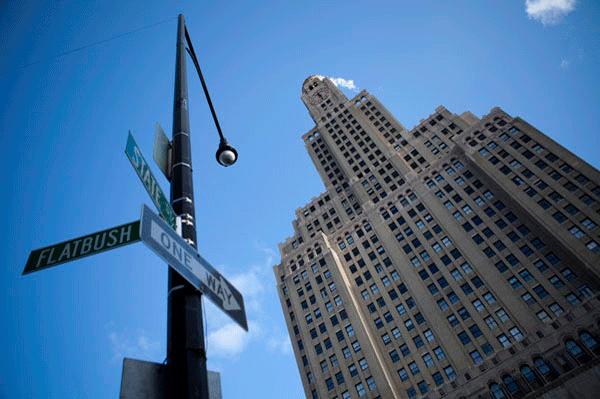
The Williamsburgh Savings Bank building, now One Hanson Place, links the borough's storied past to the more affluent side of its present.
The vast majority of the 188 responses to last week’s gentrification survey view the “g” word as problematic, but there was disagreement about exactly what’s wrong with it, whether there’s anything right about and what potential there is to address it.
The survey was an attempt to capture some of the complexity and nuance in the argument over whether gentrification is a threat to New York’s identity or a positive force or a little bit of both.
The most popular choice, drawing 25 percent of responses, was “Gentrification is a good thing for the city, but we have to deal with the fact that it hurts people with low, moderate and even middle incomes.” Some 49 percent of respondents took a darker view that rejected the notion that gentrification has positive aspects, although they split over the origins of the threat.
Another 5 percent acknowledged the negative impact gentrification has on some communities, but chalked that up to “economic reality.”
Ten percent of respondents thought gentrification was overhyped, 5 percent thought is was a common thing to city development and about 3 percent saw it as a purely benign force.
Here are the results:
1.) Gentrification is a good thing for the city, but we have to deal with the fact that it hurts people with low, moderate and even middle incomes. 46 responses, 25 percent
2.) Gentrification is the intended result of the racist/classist combination of government policy and personal choices, for which elected officials and individual renters/owners are accountable. It won’t be reversed without a broader reordering of society. 43 responses, 23.4 percent
3.) Gentrification is an unjust and destructive phenomenon fostered by local tax, wage and development policies. School and policing policy may also play a role in encouraging it. It can be reversed. 27 responses, 14.7 percent
4.) Gentrification is harmful to the city’s socioeconomic diversity and culture, but is the product of global economic forces that local, state and even federal policy would be hard-pressed to offset. 20 responses, 10.9 percent
5.) Gentrification is overhyped. In huge parts of the city, concentrated poverty and economic isolation are the overriding concern, as they have been for decades. 17 responses, 9 percent
6.) Gentrification is a good thing for neighborhoods and the city. It does hurt low-income people who cannot afford to remain in improving neighborhoods, but that’s just economic reality.10 responses, 5.4 percent
7.) Gentrification is neither good nor bad, but rather is—and always has been—part of the evolution of the city. We just have to accept it. 10 responses, 5.4 percent
8.) Gentrification is an entirely positive development. It brings new and interesting stores to neighborhoods, improves diversity, and fosters a tax base that supports services for the poor. 5 responses, 2.7 percent
Some respondents went beyond out menu of choices:
“In most part gentrification is a corporate tool directed with the help of self-appointed government administrators: Corporate executives appointed to seat (sic) on local boards with the power to recommend policies that empowers their interest and that of their employers.”
“Gentrification was a specific term that has grown to include all types of neighborhood change (new development included) and has become pretty meaningless. Change happens.”
“A City that attracts an increasing the number of high income and high asset individuals in the City is a good thing for the City’s tax base, its cultural institutions, and it forces officials to maintain a higher level of services. An attractive City that does not have housing starts equal to the number of new households will inevitably lead to an increase in the cost of housing. Stringent building codes and zoning restrictions add to the inability to create new units and affordable units. The rent regulation programs should be kept in place and additional resources from the expanding tax base should be used to create subsidized affordable rental units.”
“Gentrification can be good and bad. Organizing current communities to develop rezoning strategies that are inclusive of new development and infrastructure while limiting displacement is the best way to create healthy and inclusive neighborhood.”
“In NYC it is hyper-gentrification helped by Mayor Bloomberg’s policies and desire to transform NYC for rich, young college grads and tourists only.”
“Let’s talk about neighborhood stabilization and revitalization instead of gentrification. It’s a loaded word that triggers more emotional ranting than rational debate.”









2 thoughts on “Your Take on Gentrification: The Survey Results”
Pingback: SNL’s funny Bushwick parody; Sheldon Silver fallout in BK; and 116% construction growth | the BK bridge
Why is “neighborhood stabilization” a term laden with overtones of race and class, and why do its advocates seem uninterested in stabilizing neighborhoods to retain the poor and working class?
i.e. why does neighborhood stabilization seem to run only one way? why does increasing poverty provoke calls for neighborhood stabilization while gentrification prompts no such thing? where are the neighborhood stabilization advocates when the displaced poor need them?